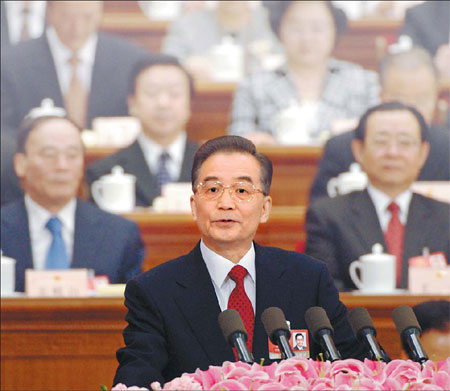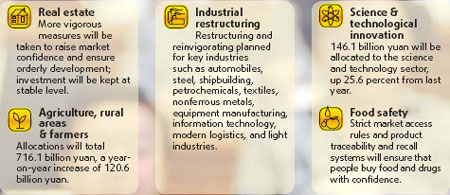|
|

NPC & CPPCC Annual Sessions > Biz & Economy > News
|
Wen: We can achieve 8% growthBy Bao Daozu (China Daily)
Updated: 2009-03-06 07:39

 Proclaiming that "no difficulty can daunt China", Premier Wen Jiabao yesterday announced an ambitious agenda for the nation's economic and social growth this year amid the backdrop of a bleak global picture. GDP is set to grow around 8 percent this year - a period for which many countries have forecast negative growth. "As long as we adopt right policies and proper measures, and implement them effectively, we will be able to achieve this target," Wen told the 3,000 or so National People's Congress (NPC) deputies and more than 2,000 members of the Chinese People's Political Consultative Conference (CPPCC) National Committee.
The CPI, a key gauge of inflation, is forecast to be around 4 percent, mainly because of the vast amounts pumped into the economy to jack up growth and create 9 million urban jobs. Wen's report on government work, along with more detail-rich reports prepared by the National Development and Reform Commission and the Ministry of Finance, were presented yesterday morning to the joint session of the NPC, the national legislature, and the CPPCC National Committee, the top advisory body. Less than a quarter of Wen's 44-page report was a summary of the government's performance in 2008, although it was a year when the country saw major ups and downs, such as hosting the Olympic Games and reeling from a devastating earthquake in Sichuan. Only a page was devoted to foreign relations, mainly related to economic matters, such as China's commitment to the international community's efforts in reforming the global financial system, opposing protectionism, and seeking an early recovery of the global economy. Wen's pledge that the country will keep the global financial crisis at bay, in particular, elicited thunderous applause. Four strategic goals were outlined by the premier:
Formulating a long-term growth strategy led mainly by domestic consumption rather than exports; Restructuring industry to shed wasteful operations and achieve higher productivity; Forging ahead with the remaining tasks of the economic reform; Protecting citizens' livelihood and expanding employment opportunities. But the long-term growth strategy requires an immediate shift. As prospects for foreign trade and foreign direct investment - key drivers of the economy through the last 15 years - increasingly get dimmer, much of the growth in the coming years hinges on domestic consumption. Increases in government spending are therefore "the most active, most direct, and most effective" way to arrest the downward trend of the economy, Wen said. Emboldened by an economy worth 30 trillion yuan ($4.4 trillion), the third largest in the world, and strong revenue incomes as well as record foreign currency reserves built up over the last decade, the premier disclosed 7.6 trillion yuan in fiscal spending in the national budget. Of that amount, the central government's budgeted expenditure will total 4.4 trillion yuan, a 24 percent increase over 2008. Of the fiscal spending by central and provincial governments, a total of 950 billion yuan will come from an unprecedented level of deficit financing, although the premier was quick to point out that the amount is manageable because it is still less than 3 percent of GDP. The fiscal deficit last year was 180 billion yuan. Observers in Beijing say it is still early to evaluate the results of the $586 billion stimulus package rolled out last November, or whether a further stimulus is needed. The policies the premier proposed for boosting domestic consumer spending and protecting jobs range from the used-car market to household assistance, and from sports and personal training to online gaming. Apart from the building of public infrastructure, Wen pledged a hefty proportion of central government spending, 908 billion yuan in total, to housing for low-income families, education, public health, culture and environmental protection. Of the amount, 43 billion yuan will be allocated to housing projects for low-income people, and 130 billion yuan for the rebuilding of towns and villages struck by the earthquake last May. A substantial amount, totaling 42 billion yuan from the central government alone, will be spent on employment generation - from more social service jobs for fresh university graduates to helping migrant and urban workers.
|